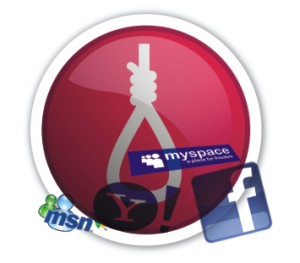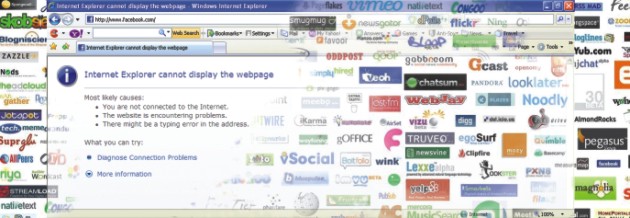| Info Tech
Suicide Online
QUAZI MOSIUR RAHMAN
 Web 2.0, a virtual suicide machine institutes its true legacy when it receives 90,000 requests, as reports the BBC, from all over the world in the very first days of its birth since it provides service to help people disconnect from online social networks. At this juncture, a question appears to be very obvious – why have people started to kill their online egos? Web 2.0, a virtual suicide machine institutes its true legacy when it receives 90,000 requests, as reports the BBC, from all over the world in the very first days of its birth since it provides service to help people disconnect from online social networks. At this juncture, a question appears to be very obvious – why have people started to kill their online egos?
Gordan Savicic of Suicide Machine says, “People just want to get rid of online profiles because they noticed they spend way too much time in front of the computer.” However, one of the severe crises our world is experiencing now is the conflict between human lives and machines especially, computers. As 'history' shows that after the Industrial Revolution and with the gradual emergence of capitalism 'the citizens of this modern world' have been required to look for operational efficiency, and thus machine started to take the place of humans in the production system and from then on they have been entrapped to be dependent on inhuman means.
Simultaneously, capitalism, as Marx says, is clearly contributing to alienate human beings from communal and societal cohesion, turning them into absolute individuals. Therefore, being under the muscular grip of Individualism classical social structure, family ties, and human morality shatter. These rootless individuals ultimately tend to take refuge in alternative lives (AL) like computer, online and other virtual devices.
The more they spend time with these devices the less time they get to nourish and caress humane relationships around and within themselves. In this way, dehumanisation avails the opportunity to pave the way to society; psychological illness and clinical depression engorge up resulting in perversions in various forms. Once again, our human existence and identity embrace the greatest shock when these people witness anomalous relations between parents and children, in particular, when along with herself a mother burns young babies, when a lover video tapes sexual intimacy with his girlfriend and leaks it via the internet for distorted entertainment.
In fact, in the name of 'development' and 'progress', these 'citizens of the modern world' are getting overwhelmingly concerned with improving outfitted efficiency. That is why they tend to be more involved with technological systems while humane emotions become irrelevant to the process.
These people are constructed to believe that their well-being is not in them rather it depends on external objects. That tempts them to trust, THEY are becoming worthless in the world that is heading towards 'sophistication' and 'development'. This reality finds a strong approval when Jean Francois Leotard says: “Men are Grown Mechanical in head and heart, as well as in hand…. Their whole efforts, attachments, opinions, turn on Mecha-nism, in the all importance of physical things, is in every age the common refuge of weakness and blind discontent; of all who believe, as many will ever do, that man's true good lies without him, not within” (Leotard, 1991).
Finally, walking along this risky avenue of 21st century mercantilism, 'modern citizens' can hardly think of their lives without using computers, internet and so on, but at least what they can do is to tighten up the reign of their dependency so that these machines do not dare to frame and influence their consciousness into unwanted menaces.
Withdrawal
KARISHMA SINHA
You feel helpless. The sensation doesn't creep in, but hits you like an oncoming bus. It's sudden and powerful. It sweeps you off, makes you erratic and irritable. All of a sudden your network is down, your laptop is at the cleaners and your blackberry/Nokia/IPhone has betrayed your trust. Reality begins to take shape and the world comes back into focus. You realise that the daily news is there to be read, but has to be procured via physical movement. It has to be done by actually picking up paper. There is a gritty feel of reconstructed-wood under your fingertips, not soft and friendly like the newsprint on a computer monitor. It takes effort and patience, as you read one half and go to the end to finish the story. It's somehow limiting and akin to claustrophobia. You read the paper with full knowledge of its limited content; the words are and will be forever encased on its ash brown body and enclosed within its pages. There are no links to follow, word to be quickly clicked on for reference, no alerts and no quick searches on “Google” or “Wikipedia”.

Inability to access your e-mail or check one of the many networking sites, be it “facebook” or “myspace” makes you feel like a solitary monk, with barely any connection to the rest of the planet. Your satellite link is down and it makes you want to shut the doors and windows and curl up in your bed. Mere thoughts of writing which implies the attempt to use pen and paper becomes daunting. If you still manage to brave this Herculean task and sit down to with a notebook and a pen, instead of the familiar rush of Microsoft Word, you feel like reality has grabbed you by the brain and has firmly grounded you to the chair. As you attempt to write at a painfully slow pace, you slip into daydreams of that wonderful soft white sheet of virtual paper, those gorgeous tabs where you can do almost anything to youwords. Thoughts of your hands flying lovingly over the keyboard bring an idiotic smile to your face.
After much contemplation you wonder why this is happening to you. Think back to the times not too long ago, ok, kind of long ago-when the internet was just at its infancy. Laptops were too expensive to be contemplated and PC's were these huge bulky stupid machines. Recognise that this is a weakness, these feelings of helplessness nothing but forces of habit. True, the virtual world and the proliferation of tablets and Mac-books or kindles are all delicious fruits of our stunning advancements in technology. But imagine for a second that its crashing, it's all so elusive anyways, this alien world of ones and zeroes. Can you honestly say, unless you are some sort of tech guru that the internet still doesn't baffle you a little bit? Ask yourself. What would happen if we suddenly were to find ourselves without chat-rooms, on-line libraries and websites? What would be civilizations coping mechanism? Too many questions, true, but questions certainly worth considering. Let these questions bother you a bit. After all they cannot possibly be as bad as the case of technological withdrawal you have been experiencing.
Copyright
(R) thedailystar.net 2010 |
|
